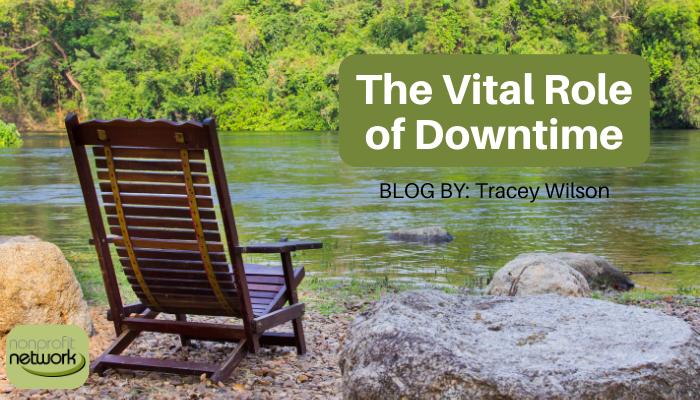

Tracey Wilson
Program Coordinator
"Sometimes the most productive thing you can do is relax." ~ Unknown
The Vital Role of Downtime
In the fast-paced and demanding world of nonprofit work, the importance of downtime for staff and employees cannot be overstated. Nonprofits tackle some of the most challenging social issues, requiring immense dedication and resilience from their teams. To sustain their mission and maintain high levels of performance, nonprofits should try to prioritize regular downtime for their employees.
In many recent staff discussions we always touch on the importance of practicing self-care. But how about when an organization makes employee care a priority? Here are just a few touch points on why downtime is particularly crucial for the nonprofit sector.
Nonprofit work often involves addressing complex and emotionally charged issues, which can be both physically and mentally exhausting. Regular downtime helps prevent burnout by giving staff the necessary time to rest and recharge. Without these breaks, employees are at a higher risk of experiencing chronic stress and fatigue, which can diminish their effectiveness and passion for the cause.
Rested employees are more productive and efficient. Downtime allows employees to return to work with renewed energy and a clear mind. This boost in productivity can significantly improve the overall performance of the organization and the quality of services provided to those in need. By investing in their employees' rest, nonprofits can achieve greater outcomes with their efforts. The demanding nature of nonprofit work can take a toll on mental health. Employees are often exposed to distressing situations and high levels of responsibility. Downtime provides a crucial period for staff to focus on self-care, reducing stress and anxiety, and promoting better mental health. This focus on mental well-being helps create a more resilient and effective workforce.
Taking breaks allows employees to step back from their daily tasks and gain new perspectives. This can foster creativity and innovation, leading to fresh ideas and approaches that benefit the organization and its mission. When employees are well-rested, they are more likely to think outside the box and develop innovative solutions to complex problems. Nonprofit staff often work long hours out of dedication to their cause so, ensuring adequate downtime can help maintain a healthy work-life balance, which is essential for long-term job satisfaction and retention. Employees who feel balanced and supported are more likely to stay committed to the organization and its mission over the long term. Regular rest periods help employees build resilience by allowing them to recover from the emotional and physical demands of their work. This resilience is critical in maintaining the stamina needed for sustained efforts in nonprofit work. Downtime helps employees bounce back from challenges.

When organizations prioritize downtime, it sends a message that they value their employees’ well-being. This can significantly boost team morale, creating a positive and supportive work environment. High morale leads to stronger teamwork, better communication, and a more cohesive effort towards the organization's goals. The success of nonprofit organizations truly depends on the sustained efforts of their staff. Downtime is essential for ensuring that employees can continue to contribute effectively over the long term, preventing high turnover rates and ensuring organizational stability. By supporting their employees' need for rest, nonprofits can maintain a steady and dedicated workforce.
In summary, downtime is not just a luxury but a necessity for those who work in the nonprofit sector. It helps maintain their well-being, enhances their ability to perform their duties effectively, and ultimately supports the sustainability and success of the nonprofit’s mission.
It is our hope that nonprofit organizations recognize their critical role in the health and productivity of their teams and will consider making downtime a priority. Even a day can make a difference. And, by doing so, those teams can continue to make a meaningful, maybe even a bigger impact on the communities they serve.
Want even more? Click here to sign up for our weekly e-newsletter. Each week you'll get a link to the most recent news, workshops, and sector updates. We promise to respect your time and will not flood your inbox. We only send one e-newsletter each week and when any timely important announcements need to be made.

